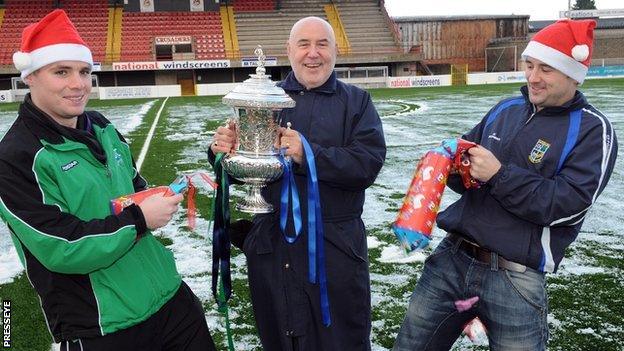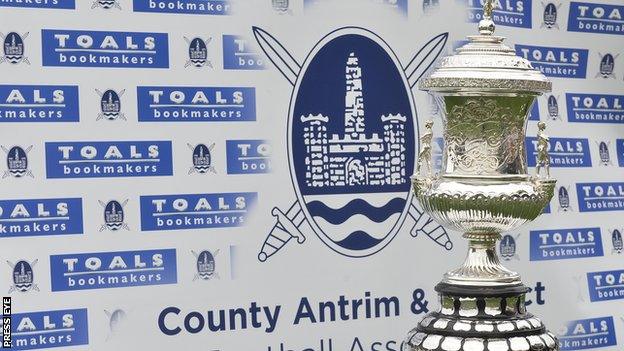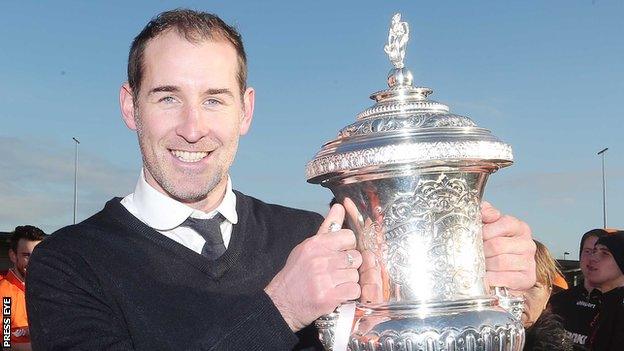Steel and Sons Cup: The festive final shaping the future
- Published
The Steel and Sons Cup is one of the oldest in Europe
The Steel and Sons Cup has been a firm festive fixture on the Northern Irish football calendar since 1895.
With Christmas Day falling on a Sunday this year, the final has a temporary date change and will be played on Christmas Eve, with Dundela taking on Linfield Swifts.
It may be one of the oldest trophies still competed for in Europe, but a landmark project between the County Antrim Football Association and Queens' University means the historic silverware is shaping the future.
It involves taking the latest 3D printing technology to create a replica of the iconic trophy, which insurers said was too expensive to be replaced.
Why is it so special?
Alan Stacey, chairman of the Steel and Sons committee, believes that the trophy is one of the most special in football.
"Because the final is on Christmas Day, it is unique. This year it is obviously a bit different as it will be played on Christmas Eve with Christmas Day falling on a Sunday," he said.

The festive feel that surrounds the Steel and Sons Cup final makes it a special and good spirited occasion.
"The Steel and Sons Cup, I believe, is the second oldest football trophy currently being competed for with the Scottish Cup being the oldest."
The original trophy, donated to the County Antrim FA by local businessman David Steel, has been presented at every final for 121 years.
"It is actually as old as the FA Cup as we know it today," says Colm Higgins, the man behind the restoration project.
"The original FA Cup was lost and had to be recommissioned so in essence this is one of the oldest trophies in the world."
'Irreplaceable'
Stacey says that the opportunity to replace the original through a replica was too good to turn down.
"It all came about through insurance. The cup is deemed to be virtually irreplaceable. It was going to cost the association far too much to replace it.
"We got involved with Colm Higgins and Queen's University and they have done a lot of it with 3D imaging. They believe they can make a replica of this trophy," he continues.
"We can now replace this magnificent trophy which is fantastic."

Running since 1895, the Steel and Sons Cup is one of the oldest football trophies in Europe.
The staff at Queen's faced a dilemma about how to approach making a replica of the cup.
"Do we model the cup as it is today or do we try and bring it back to its glory of over 121 years ago? We felt it was better to go back," says Colm.
"Using the latest 3D scanning technology we are able to scan the cup and create a cloud-point data of the cup as it currently stands. We had a student, Eimear, who was in on summer placement.
"She was able to do a lot of the modelling and through her artistic background she was able to regenerate the cup into what is essentially its original glory. There are a lot of fine details that have to modelled in if we are to get a perfect replica."
Despite the technology available to the NI Technology Centre, traditional methods are still likely to be required.
"We can use modern manufacturing techniques and explore them to get the cup to a stage where the silversmith can then do the finishing touches.
"I definitely feel that there is an opportunity. We do know that in the world today there is a lot of this technology used to capture historical artefacts to create a digital record for the future."
'The atmosphere around the place is very unique'
Steel and Sons Cup: Baxter and Haveron recall triumphs
The Steel and Sons Cup is played between teams at reserve and intermediate level, with the festive final being the biggest trophy a team playing at that level can win.
Many of the biggest names in Irish League management have connections with the famous trophy, and the meaning of the Steel and Sons final still resonates among them.
Currently on track for a third consecutive Irish League title this season, 11 years ago Crusaders were cutting their teeth at Championship level after being relegated at the end of the 2004/05 season.
Stephen Baxter took charge at the North Belfast outfit in 2005, and he lifted the Steel and Sons in what was his second trophy in charge of the club.
Crusaders beat Dundela 4-1 in the final, and Baxter can still recall the special feeling from that day.
"When you see the celebrations and what that means to teams that generally tells you what it means for a football club," he recalls.

Current Glentoran manager Gary Haveron won the Steel and Sons Cup with former side Carrick Rangers in 2014.
"They will come to Seaview in front of a packed house. You normally see some exciting young talent among some of the experienced heads."
Current Glentoran manager Gary Haveron, who managed Carrick Rangers to Steel and Sons success in 2014, reflects on the extra special victory for Carrick.
"When we played in it it was a fantastic occasion. The atmosphere around the place was very unique and everyone is in good spirits. It is a fantastic trophy and a fantastic occasion."
A Fitting Farewell
Jonny Frazer scored a hat-trick in the semi-final win over Crumlin Star
With the upcoming final set to be the final time that the winners will take the iconic trophy home, it is fitting that it will be contested between two sides that have a strong connection with the trophy.
Dundela will be competing in their 22nd final and will be aiming for their 11th win. Linfield Swifts will be aiming for their 10th win in the competition, with their last success coming in 1997 with a golden goal victory over Dundela.
A Jonny Frazer hat-trick sealed Linfield Swifts' place in the final as they overturned a two goal deficit to beat Glebe Rangers 3-2.
Despite this being the first final for a young Swifts side, Frazer acknowledges the history and importance of the cup.
"Everyone knows that the Steel and Sons is a huge competition. It has a lot of history and history with the club. It would be really special if we could take it home for one last time."
Dundela duo aiming for historic victory
In contrast to a young Swifts side, the Steel and Sons trophy is part of Dundela's DNA.
The East Belfast side's coaching trio of David Murphy, Stephen Gourley and Gary Walker all lifted the famous trophy as players, and they will be aiming for similar success after their move into management.
"It has a great association with the club," says Gourley, who was club captain for Dundela's 2013 success. "It would be extra special to walk back into Wilgar Street with the cup for the last time."
Murphy adds: "Hopefully we can bring it back for the last time and have that bit of history."
Highlights and post-match reaction from the 2016 final will be available on the BBC Sport NI website.